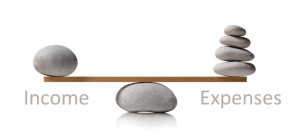Welcome back to House Hunting with Girlsvsblog! In our last post we talked about managing the budget…now that we have broken down our budget and have a clear view of how much we can afford to spend each month on a home it is time to speak with a lender about financing!
When it comes to home loans there are a multitude of options available. In fact there is so much to know and so many options available people have written entire books on the subject! Here we are just going to touch on a few basics to get you through the door. Once you are settled on the type of loan and lender that works for you it is always advisable to do more focused research.
To start there are conventional loans for those who have a higher down payment (usually 20% or more, but sometimes as low as 5% down), and usually a higher credit score. Conventional loans are the most “stable” loan and gives the buyer the greatest buying power. While some loans come with neighborhood or house condition restrictions, a conventional loan allows individuals to purchase any home within their budget (we’ll touch on loans with restrictions when we discuss FHA loans). When it comes to conventional loans there aren’t many hard and fast rules that all institutions need to follow; because of this there are many options available for home buyers. While some lending institutions may require 20% down but provide some lenience y with credit score…other lenders may have very strict credit score requirements but only require 5% down. In any case going with a 15-30 year fixed conventional loan is a smart choice.
The second kind of loan is a lender specific non-conventional loan or “other” when listed in real estate ad requirements. These loans have more buying power than FHA loans but less than conventional loans. While a conventional loan requires a minimum of 5-20% down payment, non-conventional loans may require as little as 3% down and some specialty non-conventional loans have in the past had 0% down during promotional periods. Non-conventional loans are created and ensured by individual lending institutions…so they set all the rules. Many of these types of loans are available through credit unions, and many times they are only available to members of the credit union. The reason the credit unions offer this specialty loan is to provide options for their patrons they know may not have a large down payment, but who have a good history with the credit union. They trust the buyer despite not having the money up front, so they create a loan to accommodate. However, because the credit union is offering a loan with little or no down payment, many times they have very strict credit history requirements.
The final types of loans we are going to discuss are FHA (Federal Housing Administration) loans and ARM (adjustable rate mortgage) loans. Many times these loans have the highest risk for the lending institution, the buyer, and the seller. As a result there are certain sellers who won’t accept these loans which will inevitably limit some of the homes available for buyers with these loans. FHA is one of the most common types of loans for first time home buyers who have very little down and who have had some trouble with their credit within the last 7 years. The reason for this is, FHA loans require only 3.5% down payment, allows for credit scores as low as 620 (occasionally lower) to qualify, and it can be applied for at most local banks/lending institutions. Lower requirements can make for jumpy sellers which is why some won’t accept this loan. ARM loans can cause sellers to be concerned because the amount due for the mortgage payment each month can change over time, which may leave the buyer with a higher monthly mortgage than they can afford. Adjustable rate mortgages usually have a specific period in which the lender guarantee’s the rate on the loan. Once you have a rate you can calculate the amount due each month and budget accordingly. With an ARM after the set period the rate may fluctuate up or down. If the rate goes down the buyer is paying less than originally – not a bad deal. However, if the rate goes up the buyer may be looking at a mortgage payment they can’t afford. This can lead to trouble- including needing to sell quickly, missed payments and even foreclosure. If choosing an ARM it is important to know the terms and to budget accordingly.
Each of these loan types and many more can be wonderful options for you as long as you do your homework! Some may find themselves discouraged by restrictions that come with FHA loans, but don’t let that deter you from purchasing a home if this is the type of loan you qualify for. It may simply be what you need to get into a home now…so you can work toward a more conventional loan buying experience in the future.

Factors contributing to someone’s credit score, for Credit score (United States). (Photo credit: Wikipedia)
What you need to have prepared for your lender: Whatever type of loan you end up with you are going to need some of the same basic documents for your lender. It is best to have these prepared when you speak with your lenders in order to expedite the process of getting approved for a loan and starting the hunt for your new home. If additional documents are needed, your lender will let you know.
- 2 months most recent bank statements for all open accounts (checking, savings, credit, etc)
- 2 months most recent pay stubs (if you have automatic deposit speak with your finance office about where to go online to print off copies.
- Name of current employer, position, and pay with company. (If possible try not to change jobs through this process).
- Primary living addresses for the last two years. If you have moved multiple times it is best to have each address written out so you don’t get zip codes and house numbers mixed up when you are being asked by the lender.
- Copies of your drivers licence (or state approved photo I.D.) and social security cards.
- Tax returns for the last two years. If you use turbo tax you can simply log into your account and print off these documents from the last two years! There is even a tab asking if you need the copy for a home loan.
- Copies of current statements for loans/debts (student loans, current home loan, CC debt, car loans, etc).
How do you pick your lender: Just like there are a multitude of home loans available there are also a multitude of lenders. Deciding which lender is best for you and who can provide you with the best loan options can be a daunting task. You can go with your local bank or credit union if you have a long standing relationship with them (many times they have special exceptions and deals for loyal patrons). You can also simply go online and look at the home loan options for all the surrounding lenders in your area and attempt to decide which loan option is best for you. However, if you aren’t sure you may be tempted to stop by each institution to find out if you really qualify for their loans…this is where I am going to throw up the red flag today! Don’t forget, every time you give out your SSN and have your credit pulled your credit report gets dinged and if you have it pulled multiple times within a short period of time it can cause your credit score to go down! YIKES! Knowing this it is best to have your credit score pulled as few times as possible. So, if you know you can and will get approved through your lending institution (you have great credit, a high down payment, and a great long term relationship with the institution) then absolutely walk in and start the process! However, if you simply aren’t sure a great option for you may be to go with a Mortgage Broker. Mortgage Brokers work directly with you to find the best loan option available for you by working with a large pool of lending institutions. You give all your info to one person, your credit score is pulled once and you are provided with your best loan options available. Mortgage Brokers are a great option because… they have not only done their homework to learn what all the institutions currently have to offer…they are happy to explain the differences to you for each and walk you through the process – from loan approval to getting to the closing table.
Why you ask for a breakdown of Loan totals, mortgage insurance, closing costs etc: You have managed your budget, you have worked with a lender to find the perfect loan for you, now don’t forget to follow through on the closing. Ask your lender for a breakdown of your final costs and what will be needed not only at the closing table but each month there after. The best advise I have been given has been to be up front and honest with your lender. Don’t simply say I want my mortgage to be $100.00 dollars or less per month, say I want my monthly payment with my mortgage, mortgage insurance, home owners insurance, HOA fees, etc to come in under $100.00 per month. Why? Because when you did your budget you probably said for this house I can afford $$$ per month – but you may not have considered HOA’s and insurance. Don’t find yourself in a dangerous situation after you get into your new home! The lender can calculate these numbers for you and help you find the best options for you.
As well don’t forget to ask how much you are going to need on hand at the closing table. You will need your down payment for sure, but you may also need closing costs if you didn’t add them into your home bid, as well as cushion in your bank account for immediate repairs the bank might require within the first few months of owning the home (such as roofing repair, plumbing, etc). Finally, even if you do have more than enough money in the bank for all the closing costs etc, don’t go out and make any large purchases before buying a home. No cars, furniture, vacations, etc! Large purchases can sabotage your closing…so if you can, WAIT. Get the house, then if you really need to go ahead and make that big purchase.







